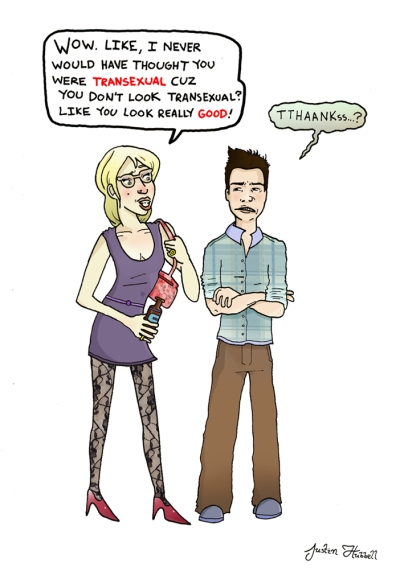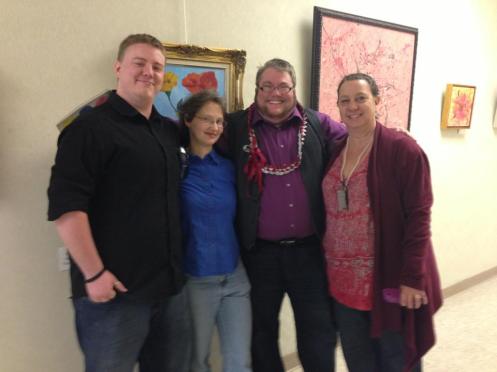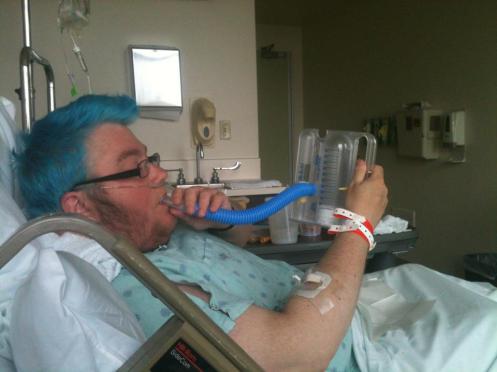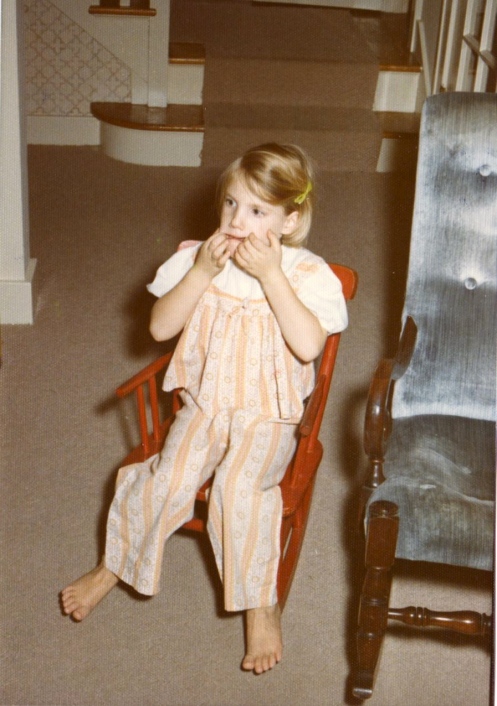© Zachary McCallum, originally published on Owldolatrous.com
Transgender people are in the media spotlight these days, and for the first time, it’s not as the butt of bigoted jokes. There have even been a spate of transgender beauty queens in the news (the inherent misogyny of beauty pageants notwithstanding.) Laverne Cox was on the cover of Time. Jared Leto won an Oscar for portraying a transwoman. There are books for parents of transgender children and sympathetic television programs about those children.
What gives? Are we really, as a people, coming to our collective senses about gender identity? I’d love to think so.
As the idea that gender identity doesn’t start and end with the genitals becomes more culturally pervasive, it’s not just the newstainment flavor-of-the-week. Real change is happening. The US Department of Health and Human Services has declared that discrimination against transgender individuals is illegal under the Affordable Care Act, and the case that led to that clarification of the rules made the national news. The FAA has made it easier for trans* pilots to be licensed, and the EEOC ruled that transgender people were covered under Title VII’s employment discrimination protections. In some countries, including Australia and Argentina, a transgender individual can specify the correct gender for their passports without needing an official stamp of approval from a medical professional; in the UK the options include not indicating gender on one’s passport at all; and even in the unenlightened US one can, with just a doctor’s letter, have a correctly gendered passport issued.
I really couldn’t tell you why trans* people have become so much more interesting to the media and acceptable to governments than they once were, but I welcome the change, since I’m one of them.
But as the cultural narrative expands to include ‘transgender person’ as a stock character, it does so in a way that’s, well, just a stock character. The trans* person in the public eye is almost always some variant on the woman who was born with a penis and just “always knew” she was female, or the boy born with a vagina who refused to wear a single dress and never touched a Barbie® Doll.
It’s a nice, easily packaged, easily understood story, and sometimes it’s even true. Some of us do know (and as those recent news articles reported, some are even lucky enough to begin transition) before puberty. But others live entire lifetimes as one sex, and then at the age of seventy or eighty or ninety, make the change. Many, like me, transition in early-to-mid adulthood after months or years of soul-searching and introspection. And there are people who identify as something other than male or female, who don’t jump across the line from boy to girl or girl to boy, but take up residence in the broad middle plain known as genderqueer.
Before we transitioned, some of us were butch lesbians or femme drag queens whose transitions were unsurprising to our friends and families, but others of us looked nothing like a Lifetime TV protagonist. I know a transwoman who is captain of a marine rescue company. Until she was in her late thirties anyone would have taken her for a typical manly sailor; now she’s an atypical, manicured sailor. I know a transman who describes himself in childhood as “a classic girly-girl.”
Even though I never felt particularly successful at femininity, I spent years wearing my hair long and dressing in dangly earrings and flowy fabrics before I decided to transition to male. I played with stuffed toys and dolls as a kid, even Barbie® (although I did cut her hair short and send her rappelling down the stairwell tied to a jump rope.)
Now in truth, I did sort of “always know”, but what I always knew was that I wasn’t like other girls. I didn’t feel like a girl. When I cast myself in stories it was always as a boy, but that wasn’t the same as believing I was a boy.
I didn’t know; I suspected.
When I decided to transition, I knew it wasn’t the traditional American ideal of masculinity I was aiming for, and in some ways the fact that I knew I wasn’t going to be a “man’s man” was part of what prevented me from transitioning sooner. Since I didn’t fit the common archetype of ultra-tomboy who always knew he was born in the wrong body, I didn’t think of transition as an option.
For one thing, the trans* person in the public story almost always turns heterosexual once they’ve transitioned: “I thought I was a lesbian, but I was really a man trapped in a woman’s body.” “I thought I was a gay man, but it turns out I was a straight woman.”
There’s nothing wrong with those stories, but they’re not my story. I’m queer—I used to call myself bisexual, but the more I’ve opened up my definition of gender, the less the two-flavors-only term “bi” appeals—I was queer before transition, and I’m still queer after it.
(Actually a lot of trans* people aren’t heterosexual. Some transwomen who identified as heterosexual before transition identify as lesbian afterward. Some transmen are gay. Some of us find ourselves inexplicably attracted to the gender we used to find unappealing; the story of the transman who used to be a lesbian and now only sleeps with other men is not uncommon. But in a culture where homosexual is a second-class status, a narrative in which the transgender person is redeemed from a lifetime of homosexual misery by becoming straight through the magic of transition, is the only story we hear.)
It was only through my deep friendships with a few, very important gay men, and being part of a larger queer community at Peninsula Metropolitan Community Church, that I realized that it was in fact perfectly acceptable for me to be a fabulous guy who wears lavender, coos over babies, cries at sad movies, talks with his hands, and owns more pairs of shoes than his sister. That I could be the kind of man I wanted to be. When I understood that, I finally gave myself permission to say, “I am male.”
But it’s true, before I said it, I carefully mined my personal history for examples of how I was never really a girl. And when I presented my decision to transition to my friends and family, it was with the “always knew” narrative well rehearsed. In that, I’m like almost every other trans* person I’ve ever talked to about the coming out process.
Why is “I always knew” the common narrative? Why do so many of us tell some version of that story even if it isn’t true?
There are several reasons that come to mind, and I think they all play a part.
For one thing, as I said above, it’s a simple, easy-to-understand story. It’s palatable, especially for people who haven’t spent much time considering gender. If you feel male, you’ve always felt male, and you were lucky enough to be born with a penis and testes and a Y chromosome—or you feel female, have always felt female, and were born with a vagina and ovaries and two X chromosomes—then you’ve probably never really questioned your own gender identity. If the transman you’re talking to says “I’ve always felt male,” or the transwoman tells you she’s always felt female, it makes sense, since to the average person gender seems obvious and intrinsic.
Another reason is that, in order to obtain medical treatment for transition, we usually need a psychologist’s sworn statement that we are suffering from a mental condition known as Gender Identity Disorder. We’re put in the tricky position of having to prove that we are both sane and rational in our pursuit of medical transition, and mentally distressed enough by the feeling that we are in a wrongly-gendered body that the only reasonable course of treatment is a medical one.
(There are a lot of transgender people, myself included, who have a real problem with that, by the way. In order to have surgery to remove my breasts and sculpt my chest into a more masculine shape, I had to spend thousands of dollars and many hours talking to a licensed psychologist first. If I’d wanted my breasts made larger—even ridiculously larger—all I would have had to do was walk into a plastic surgeon’s office, pick out my new cup size, and fork over the cash.)
Add to that the fact that in order to get new legal documents with our names and gender markers correct, we have to submit a medical doctor’s statement that we have “completed transition,” and you can see why we get so good at the “I’ve always known” story. It’s a lot easier to convince a psychologist, a physician, and a judge if your story is locked up tight, with no ambiguity or ambivalence.
To be fair, changing gender is a big deal. Gender is, after all, the very first thing we use to categorize someone. Is the new baby a boy or a girl? Snips and snails and puppydog tails, or sugar and spice and everything nice? It defines and constrains almost everything about how we behave, what’s expected of us, and in many ways, who we are.
Long before we ever came out to anyone else, we had to come out to ourselves. We’ve agonized over it. Should we? Dare we? What if we lose the love of the people closest to us? What if we’re mocked? What if we’re shunned? What if we get fired? What if we’re killed? And we ask ourselves the questions we imagine our friends and family will ask, too: What if we’re wrong? Are we just fooling ourselves? Should we just try a little harder to conform to the gender we were assigned at birth?
The “I always knew” story is comforting; it’s a story we tell ourselves to quiet those fears. It makes it easier for us to trust our own reality if we can look at our pasts and see the evidence piled up. For a transwoman: having pink and purple as favorite colors; loving baking and playing house and dress-up; hating team sports; just wanting to be Mommy’s Little Helper. For me: I wanted to wear my cowboy boots every day. When we played make-believe I was always the prince, never the princess. I loved catching turtles and toads and snakes. A child psychologist once told my parents there was something wrong with me because I didn’t understand I was a girl.
After years of being ashamed of those things, because they marked us as failures at our assigned genders, it’s a relief to be able to point to them and say, “See? That’s what was wrong with me. I wasn’t a failure of a girl, I was just a boy all along.”
And once we have convinced ourselves, we need to convince everyone else. We want there to be no question in anyone’s mind that this is the right thing. That we’re making the right choice. That there is no other path. So we gloss over the times when maybe we didn’t feel like we were born in the wrong body, we omit the part where sometimes we liked dressing up in high heels and makeup, or working on cars and watching football, or any of the hundreds of other gender-stereotyped things about us that didn’t conform to our newly stated gender identity. We want to assure everyone that whatever gender they may have once thought was ours, this one, the one we say we are now, is the right one.
Which brings me to a question I want to leave with you: Why are we, as transgender people, challenged by others to prove we really are who we say we are? Why do we feel this reflexive need to prove our genders beyond a shadow of a doubt? Because when we find ourselves backed into the “I always knew” corner, we end up doing the same thing we did all those years we were trying to fit the gender we were assigned at birth: repressing an essential part of ourselves for fear it will betray us.
Ironically, as I become more comfortable living as male, I am less threatened by the fact I was once identified as a girl. I can look at the whole picture and say yes, this is who I am. It’s one of the reasons I don’t want to get a reissued birth certificate. Though I want my passport and driver’s license and the deed to my house and title to my car in my current name, with my current gender, I don’t mind if the government still records the birth of a baby girl. I just want the people in my life now to agree that she grew up to be a good man.
Trans*—a term that stands for transgender, transsexual, transmasculine, transfeminine, and gender-transgressive. I use it in order to be as inclusive as possible when talking about people outside of the gender binary.













What Others Said